





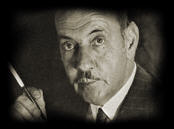
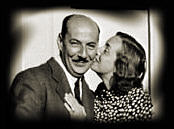
Find
out more:
www.goering.dk
The famous Reichmarshal Hermann Goering aided Adolf Hitler's rise to power and for years he was second in importance only to Hitler in The Third Reich. As founder of the Gestapo, Hermann Goering was instrumental in creating the first concentration camps for political dissidents and a prominent leader of the final solution, the murder of 6.000.000 Jews. Next to Hitler the man who played the largest part in the shaping of the Nazi inferno ..
But his
younger brother Albert
Goering loathed all of Nazism's inhumanity and at the risk of his career,
fortune and life, used his name and connections to save many Jews and
gentiles.
The parallel with Oscar
Schindler is inevitable. The story of Albert Goering, however, is almost
unknown - he was
shoved into obscurity by the enormity of his brother's crimes. But testimonies
of survivors and a report,
buried until recently in British archives, documents that Albert Goering
actually saved many lives from the horrors of Holocaust.
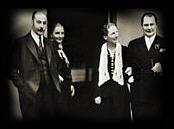
Albert
and Hermann
There were all the
difference in the world between the two brothers, though they were very fond of
each other. The elder Hermann with his bright blue
eyes, bold, resolute and completely without fear, loved his youngest
brother, Albert, who was a sad boy with doe-brown
eyes, looking uncannily like his godfather, Baron
Hermann von Epenstein, intimate with their mother Fanny.
The author Leonard Mosley tells in his great biography The Reichmarshal
that the resemblance became so noticeable that most people who saw them together
assumed that they were father and son. And with the birth of Albert, von
Epenstein announced that he was adopting all five of Fanny' s family as his
godchildren. "Godfather had made Hermann his favorite godchild until then,"
said his sister Olga in later years, "but after Albert's birth he was
always fussing over him ..."
All his life Albert was a
man of deep moral conviction. He soon became disenchanted with the Nazis, went
to Austria and lived for a time on
an allowance from von Epenstein. He worked in a film studio in Vienna and often
spoke out against Adolf Hitler and the Nazis. Once the Germans marched into
Austria, he might be in trouble, but Hermann
Goering protected him and kept him out of the hands of the Gestapo.
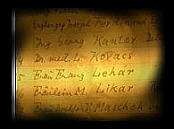
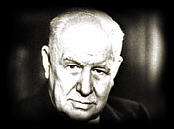
Goering's List with 24 names - and Franz Lehar
As the brutality of the Nazis
accelerated with murder, violence and terror, the seeds of their plan for the
total extermination of the Jews dawned on Albert Goering in all its horror - he
saw the Jews as mothers, fathers, children. So he decided to act and
helped
many Jews escape from Vienna by procuring travel documents. Once he had his
brother guarantee the safety of the
famous composer Franz Lehar's Jewish wife.
Professor Guido Knopp, head of history and current affairs at ZDF, a German
national television channel, tells in his book Hitler's Holocaust that
Albert Goering was always willing to help those in need. On one occasion - in
the autumn of 1943 - he signed passports with his own hand for a Jewish family
he had befriended. Once he persuaded SS chief Heydrich to release some Czech
resistance fighters from the cellars of the Gestapo.
Richard Sonnenfeldt, chief interpreter and youngest member of the American
prosecution team at the Nuremberg War Crimes Trial, later recalled how the
Reichmarshal enjoyed displaying his power to Albert by freeing Jews from
the concentration camps. "Albert would go to his brother Hermann and say,
'Hermann you're so big and so powerful, and here's a Jew who's a good Jew and
doesn't belong in a concentration camp'," Sonnenfeldt said.
" 'Can't you just sign a paper?' And Hermann would say, 'This is absolutely
the last time I'm going to do this, don't come back'," said Sonnenfeldt,
80, on a tour of Germany to promote a book about his Nuremberg experiences Mehr
als ein Leben. "A month later, Albert would be back," he said.
"We found a hundred people on Albert's list that were freed. All because
Goering had such a need to show off to his younger brother."
Albert was arrested by the Gestapo several
times, however was released with the help of his brother.
Tatiana Otzoup Guliaeff was only six years old when she saw Albert Goering, her godfather, for the last time in Vienna. Her parents and Albert were very close friends and only through the efforts of her godfather were the family able to flee with false papers.
Tatiana later told this amusing anecdote about Albert in Austria: Whenever the family would walk into a store with Albert and were able to find whatever they needed, he would always depart saying 'Gruess Gott' (God greet you), but, if the items were not to be found, he would sarcastically say: 'Heil Hitler'.
Later - as part of his job as export director of the Czech arms factory Skoda - Albert Goering was able to save many employees, among them the director Jan Moravek and his family. He protected several members of the Czech resistance and covered resistance actions.
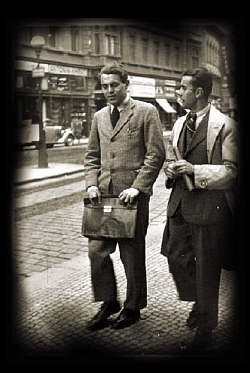
Karel Sobota in Prague
Karel
Sobota,
for several years assistant to Albert Goering, worked in the
Exports Department of Skoda and endangered himself by taking actively part
during the german occupation of Czechoslovakia, related to the Czech Resistance
movement against Nazism. Karel Sobota later recalled how Albert Goering refused
to return the Nazi salute when Nazi officers visited Skoda. At that time, this
refusal was sufficient for one man to be imprisoned or worse.
Albert Goering insisted that all people, no matter the rank or position, be
announced to him before entering his room. Karel Sobota later told how a high
ranking SS officer one day arrived in Skoda and quickly entered directly in
Albert Goering's room with Sobota unsuccessfully trying to block him. In a rage,
Goering expelled the Nazi from his room and ordered him to wait outside.
Then Goering begged Karel Sobota to come in and sit down by him, he calmly talked
about the weather, his family and they both examined some of Albert's picture
albums. This took about thirty or forty minutes.
Said Albert Goering: - 'Well, Herr Sobota, now it is time to let that Nachtwachter talk
to me. Please allow him to come in ..' (night watcher, in german, reference to the black SS uniform).
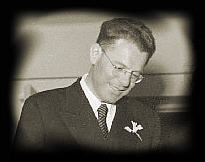
Karel Sobota defied the Nazis
The employees were very grateful to Albert Goering due to the human treatment he always gave to all Czechs and people of other nationalities. At that time passive resistance was the order of the day. Any work in the lines of production or in the administrative area always took much more days to be done than was initially expected. Karel Sobota recalled how Albert Goering looked the other way as the Czech employees made wrong translations of catalogs, 'forgot' to do tasks assigned to them, left work unfinished in their desks or 'lost' important documents. The employees risked their lives - had they been caught red-handed by the Gestapo or the SS, they had been executed on the spot.
Albert
Goering is credited with many acts of kindness, small and large. Even today
survivors remember once he took
off his jacket, went down on his knees, and scrubbed a sidewalk together with
Jews who were ordered by the Nazis to do so in public as a humiliation.
The physician Laszlo Kovacs had been the
personal doctor to Albert Goering since 1939. He later recalled hearing Goering
say:
'I defy Hitler, my brother and all the National Socialists.' He
began giving Kovacs money and set up a joint bank account at the Bank Orelli in
Bern which he instructed Kovacs to use to help Jewish refugees to get to Lisbon.
After the German occupation of Italy in 1943, Goering wrote out a laissez passer
for Kovacs as his personal doctor.
When Albert was stationed
in Bucharest, Rumania, two Nazi officers saw him standing on a balcony and
recognized him as the brother of Hermann Goering. They did the Nazi salute 'Heil
Hitler' in front of him,
but Albert coldly replied 'you can kiss my ass ...'
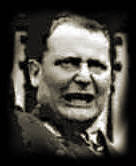
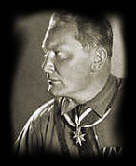
Hermann
Goering
After World War 2 Hermann Goering was found guilty at Nuremberg in war crimes and crimes against humanity and sentenced to death by hanging. On 15 October 1946, two hours before his execution was due to take place, he committed suicide in his Nuremberg cell, taking a capsule of poison that he had succeeded in hiding from his guards during his captivity. Shortly before he had his brother Albert promise that he would take care of his wife Emmy and his little daughter Edda.

Albert Goering - saviour of victims of the tyranny his brother helped create - was imprisoned for several years after the war for his name alone. During the post-war-years he had many difficulties, the name Goering had become an almost impossible handicap. Grateful survivors, rescued by Albert Goering, helped him survive bitter years of joblessness. He married several times and died in 1966, after working as a designer in a construction firm in Munich.
Albert Goering proved that humanism knows no borders, no race, no family ties ...
Tatiana Guliaeff and her family never forgot the selfless generosity and heroism of Albert Goering, his love and compassion toward mankind. She later wrote this letter to him titled 'Onkel Baer':
|
Tatiana
|
|
|
Acknowledgement and thanks to Tatiana Otzoup Guliaeff and Jorge Sobota |
|
|
|
sources:
Jorge
Sobota
Tatiana Otzoup Guliaeff
The Real Albert Goering 3 BM-TV Prod. for Channel 4, Prooducer Daniel Korn
The Reichmarshall by Leonard Mosley
Veja,
de Dez/98
Reuters
Louis Bülow Privacy ©2016-18